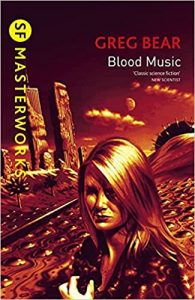Greg Bear (1951-2022)
 The Fantasy Hive is sad to hear of the passing of Greg Bear. Bear was an American science fiction writer who started publishing SF in the 60s and 70s, and would eventually become one of the genre’s key voices in the 80s and 90s. He was one of the original cyberpunks, with his story ‘Petra’ included in Bruce Sterling’s Mirrorshades: The Cyberpunk Anthology (1986), and would become best known for his hard science fiction.
The Fantasy Hive is sad to hear of the passing of Greg Bear. Bear was an American science fiction writer who started publishing SF in the 60s and 70s, and would eventually become one of the genre’s key voices in the 80s and 90s. He was one of the original cyberpunks, with his story ‘Petra’ included in Bruce Sterling’s Mirrorshades: The Cyberpunk Anthology (1986), and would become best known for his hard science fiction.
In 1985, Bear would release two of the novels that would mark him out as one of the most significant voices in science fiction. Blood Music, expanded from his 1983 Hugo and Nebula Award-winning novelette, is a masterpiece of post-cyberpunk fiction, its powerful imaginings of a world and humanity transformed by nanotech leapfrogging ahead of even the work of fellow cyberpunk pioneer William Gibson, whose Neuromancer was only released the year previously. Its biopunk extrapolations still feel startlingly relevant, and its explorations of possible posthuman futures for humanity still resonate. Bear’s other masterwork of the year, Eon, is the kind of space opera underpinned by rigorous scientific extrapolation that would become synonymous with his name. The novel follows a group of astronauts exploring a hollowed-out asteroid whose final chamber is infinite. Bear draws on the big idea science fiction of his predecessors like Arthur C. Clarke and Robert A. Heinlein, but both his understanding of the mind-bending extremes of physics and his characterisation exceeds those of his forerunners. The story would be continued in the sequel Eternity (1988) and the prequel Legacy (1995).
 Bear would continue to explore the possible effects of nanotechnology in his future history Quantum Logic series, beginning with Queen of Angels (1990). Darwin’s Radio (1999) and its sequel Darwin’s Children (2003) is another powerful work of biopunk, exploring the evolutionary potential of engineered retroviruses to kickstart humanity’s next evolutionary stage. While hard science fiction, cyberpunk and biopunk remain Bear’s most well-explored genres, he was also capable of writing engaging and lyrical fantasy, as in his Songs of Earth and Power sequence, comprised of The Infinity Concerto (1984) and The Serpent Mage (1986).
Bear would continue to explore the possible effects of nanotechnology in his future history Quantum Logic series, beginning with Queen of Angels (1990). Darwin’s Radio (1999) and its sequel Darwin’s Children (2003) is another powerful work of biopunk, exploring the evolutionary potential of engineered retroviruses to kickstart humanity’s next evolutionary stage. While hard science fiction, cyberpunk and biopunk remain Bear’s most well-explored genres, he was also capable of writing engaging and lyrical fantasy, as in his Songs of Earth and Power sequence, comprised of The Infinity Concerto (1984) and The Serpent Mage (1986).
Bear leaves behind him works that make up the cornerstone of 80s and 90s science fiction. Although fascinated by big concepts involving physics, biology and technology, Bear’s best work shows that he was equally engaged in the humanity of his characters, creating stories that first and foremost tell us more about ourselves and how we confront the universe around us. The Fantasy Hive’s thoughts are with his family and friends at this difficult time.
